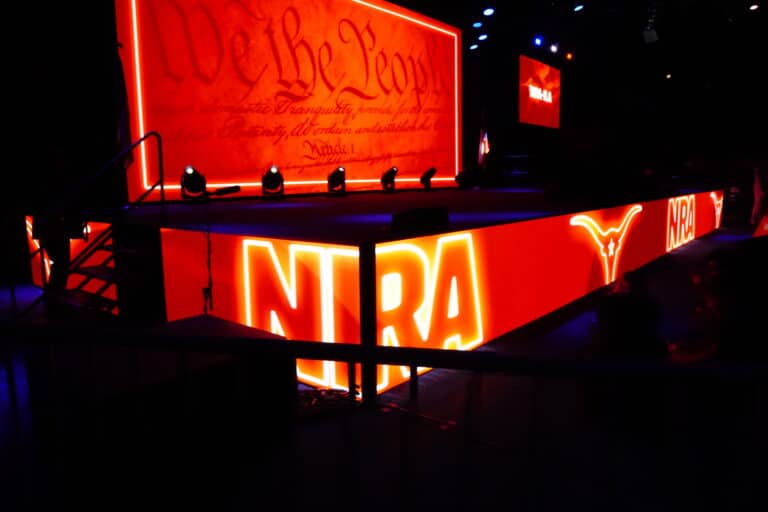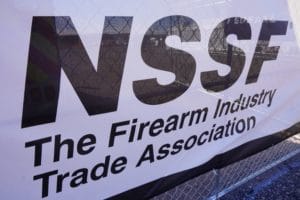The National Rifle Association’s leadership faces exile at the hands of a New York court. Whether that happens will depend to a significant degree on if the judge and jury view a mountain of questionable decisions as merely unwise or actively corrupt.
Now, some of those decisions aren’t really in dispute. Nobody at the NRA is trying to defend everything that’s come to light over the past five years. The defense offered by the organization and individual defendants, such as former CEO Wayne LaPierre, involves admitting some inexcusable wrongdoing.
For instance, LaPierre openly admitted he shouldn’t have charged the NRA for all of the private flights his family members took when he wasn’t on board. He also said he should have disclosed the yacht trips he took with a top NRA contractor. He admitted his former assistant stole from the group to pay for her son’s wedding. Even John Frazer, the group’s top lawyer, said he took excess benefits in the form of underpaying to buy a company car.
There’s no question malfeasance occurred. But LaPierre and the NRA also claim the bulk of those wrongly diverted funds have been paid back already. And they claim the failures that led to those funds being diverted have already been fixed.
However, there are plenty of expenses and management decisions that individual defendants and the NRA have disputed as being outside the limits of good governance.
Some of them will be easier to defend than others. LaPierre made the case that some of his extravagant expenses were necessary as part of an ongoing effort to recruit high-profile members. He said some of his yacht trips and helicopter rides were in service to this effort, which he argued helped normalize the NRA to many Americans.
“The other side has always tried to push the NRA to the fringe,” LaPierre testified in a Manhattan court this week. “So, I tried to build relationships with all of these cultural institutions that have an influence on American society. NASCAR, country music, NFL alumni, the NBA.”
The NRA was undoubtedly able to recruit many big-name celebrities to its side over LaPierre’s tenure. And some of its best-known moments were centered on those A-listers. LaPierre argued that helped them bring in donors and raise Americans’ opinions of the group.
“It produced donors,” he said. “It produced goodwill.”
LaPierre’s expensive safaris were part of a similar effort to boost his and the NRA’s standing with hunters. He argued that while he found the safaris themselves “interesting,” they didn’t represent a misuse of funds because they were for a TV show. He didn’t fire a shot that wasn’t recorded, and the hunting show was designed to bring new hunters into the NRA fold.
“To me, it was all business,” he said.
The payoff from those trips is much less clear. A safari episode where LaPierre shot an elephant was deemed too controversial to even air. Clearly, it didn’t do anything to improve LaPierre’s image with hunters. When news of its existence broke, it had the exact opposite effect.
Similarly, punting the NRA’s legal strategy to an outside firm and paying that firm nine figures over a few short years came under scrutiny during the trial. NRA General Counsel John Frazer admitted it was Brewer Attorneys and Counselors rather than him who were at the center of nearly all the group’s major legal decisions since 2018. He also said the NRA had paid the group north of $100 million in that time.
Frazer testified that this arrangement works fine and the costs are justifiable.
“The NRA was placed under attack on a whole variety of fronts,” he said. “Basically, we were dealing with a lot of issues and, arguably then, the leading candidate for the AG’s office said that she was going to investigate us, called us a terrorist organization, and so on. Preparing for the possibility of what became this litigation is actually something that got us looking at course corrections.”
The judge and jury may find all of these decisions to be unwise. Perhaps many observers will. But that’s a different determination than whether they rise to the level of misconduct.
That’s a harder standard to hit.
And New York Attorney General Letitia James’s job is more difficult than even that. She has to show the mountain of questionable expenses and decisions were not just inappropriate but that the conditions in the group that allowed them to happen still exist. She’ll likely have to convince the judge and jury the corruption and negligence are ongoing if she wants to see an overseer appointed.







4 Responses
It would be an interesting podcast to interview someone with a solid/sober track record in corporate / business law to discuss the burdens that exist on either side of this case. Can we understand more about that burden the prosecution needs to meet, and then how the defense for each of the individuals and the organization would “typically” be structured in such a case, even assuming that such an expert may not be following this case specifically. Maybe someone like a retired judge who provides corporate mediation services today or lawyers who have some experience in similar cases. I have no particular suggestions, but would love to hear such a discussion.
That’s a very good idea. I’ll look for a guest along those lines.
“She’ll likely have to convince the judge and jury the corruption and negligence are ongoing if she wants to see an overseer appointed.”
Hand-picked Democrat NY judge; hand-picked Democrat NY jury.
Easy peasy.
The judge already denied her request to dissolve the organization. So, I don’t think it follows that he’s going to do whatever the AG asks. And, as with all trials, the NRA had their say in picking the jury too.